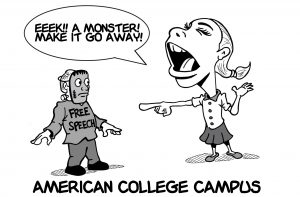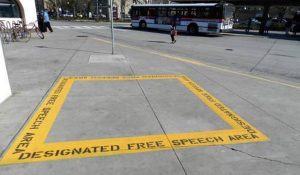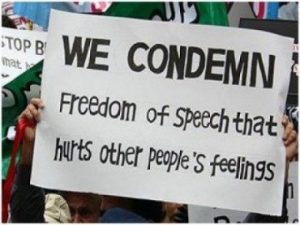I have often posted on this topic. Here is commentary from Rachel L. Brand, former Associate Attorney General of the United States. She makes excellent points about the erosion of Free Speech and the First Amendment at universities—places where diverse opinions SHOULD be available to all students but are not. As a former college dean and professor at the University of Illinois, I can attest to the truth of what Ms. Brand says in her commentary. I was often appalled at how speech that didn’t fit the leftist narrative was restricted and, in some cases, banned in the classroom and on campus.
By Rachel L. Brand, Former Associate Atty General of the United States
Free speech is under attack at college campuses across the country. The problem is not limited to a few colleges barring radical speakers to avoid a riot. Universities, large and small, public and private, restrict students’ and professors’ speech or enable others to silence speech with which they disagree.
These restrictions take a variety of forms. For example, speech codes at many colleges ban speech that is “offensive,” a subjective standard that allows college administrators to arbitrarily ban speech they find disagreeable. For example, Georgia Gwinnett College stopped a student from speaking about his religious faith because it “disturbed the comfort of persons” – even after he had gotten a permit from the school to speak.
Other schools claim they allow free speech but impose so many rules and procedures that it is almost impossible for speakers to reach an audience. For example, Pierce College in Los Angeles limited students’ “free speech” to a space the size of a couple of parking spots and required a permit to speak even there. At a community college in Michigan, a student was arrested and jailed for handing out copies of the U.S. Constitution because they didn’t have a permit.
Even where they don’t limit speech directly, schools’ actions often enable students to silence others’ speech through shouting, threats of violence, or actual violence.
Sometimes schools fail to prevent students from intimidating and even attacking speakers, as happened at Middlebury College, where student protesters violently shut down a debate and physically assaulted one of the school’s professors. In other cases, schools’ policies effectively encourage this behavior by imposing particular limitations on speakers they deem controversial.
A new policy at Berkeley, for example, imposes a curfew, security measures, and location restrictions for events that administrators decide are likely to “interfer[e] with other campus functions or activities.” Turning this policy into a heckler’s veto doesn’t require much creativity. If you disagree with a speaker visiting campus, declare his views offensive, and threaten to riot, and the speaker will be sidelined.
The net result of these policies has been a narrowing of the views expressed on campuses and, therefore, the range of opinions students hear. The heart of a university education used to be exposure to a wide range of ideas and the opportunity to debate their merits to inform one’s positions and learn to articulate them persuasively. This has taken a backseat to students’ desire to be comfortable and affirmed. University administrators, faculty, and students – not to mention the parents and taxpayers who are footing the bill – should be concerned that this change diminishes the quality of higher education.
And everyone should be concerned about threats to free speech, regardless of their political beliefs. It should not give anyone comfort that she disagrees with the speech silenced at the moment. Viewpoints that are mainstream now may quickly become minority views, and vice versa, as has happened repeatedly throughout history. That is why protecting even unpopular speech in the short run benefits everyone in the long run.
When public universities restrict speech, it has constitutional implications as well. The First Amendment prevents government institutions from imposing speech restraints such as arduous speaking permit restrictions or arbitrary curfews, particularly if the school discriminates against particular viewpoints. Yet this is precisely what many university speech policies do.
[NOTE: Sadly, The U.S. Department of Justice under the Biden administration is standing on the sidelines while public universities violate students’ constitutional rights. This stance is a departure from the behavior of the DOJ during the Trump administration when it filed several briefs supporting lawsuits against universities that violate the First Amendment. R. Yates]
Defending the fundamental constitutional rights of all Americans is a core part of the Department’s mission, and protecting free speech rights is particularly important. Free speech is not only a fundamental right but, as James Madison said, the “effectual guardian of every other right.” Free speech enables citizens to advocate for all their other civil rights and is the single most potent bulwark against government tyranny.
This is perhaps why our Founders protected it in the very first amendment of our Bill of Rights. It is also why the Department of Justice during the Trump administration worked so hard to protect it – free speech is too important for the Department of Justice not to speak on its behalf.
Rachel L. Brand is the former Associate Attorney General of the United States. As Associate Attorney General, she serves\d as the third-ranking officer in the Department of Justice.




Young people today are no longer educated, they are indoctrinated. Sadly many of the teachers I know at every level are unaware that they are doing so. That is equally sad to me.
Indoctrination is no longer the exception–it is the rule, especially in higher education, and increasingly in K-12. Fortunately, many states (about 29 so far) are waking up to this destructive methodology in our public schools and banning things like CRT and the phony 1619 project. Sadly, it may already be too little and too late.